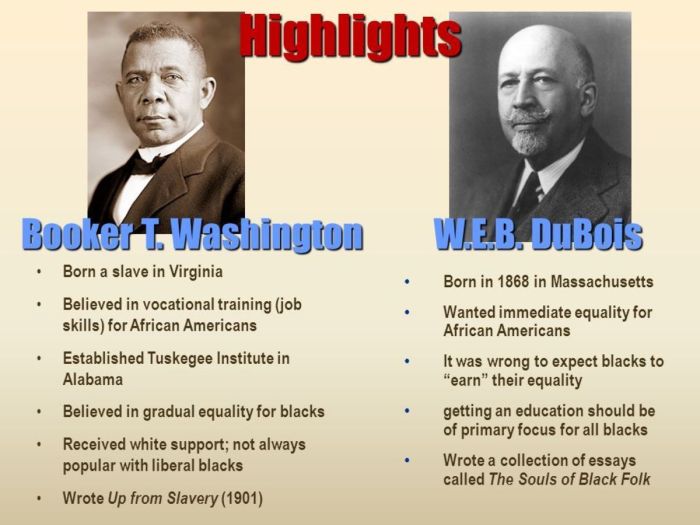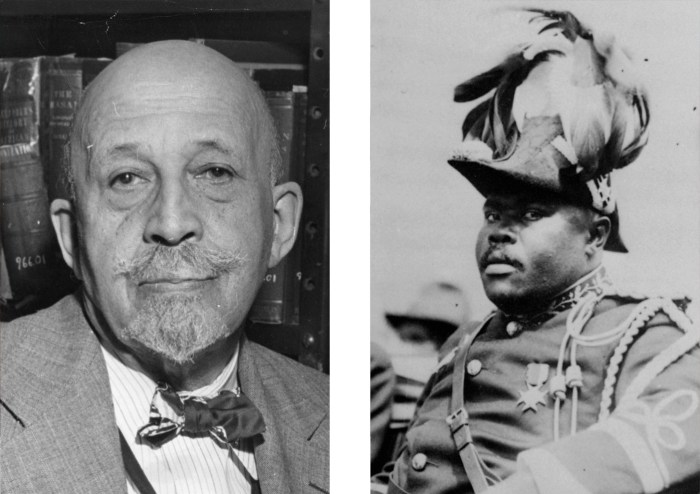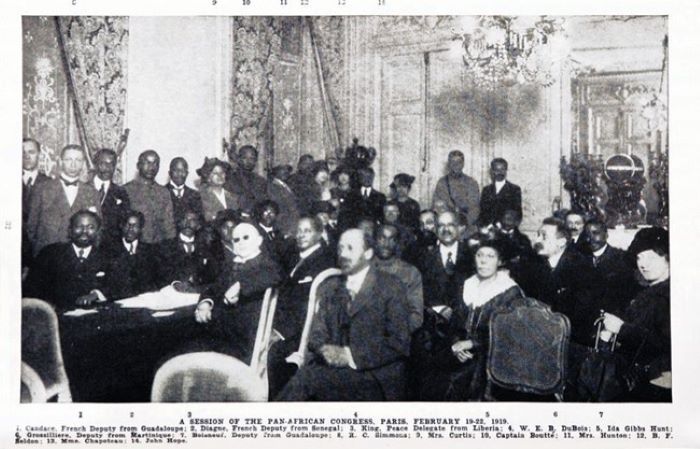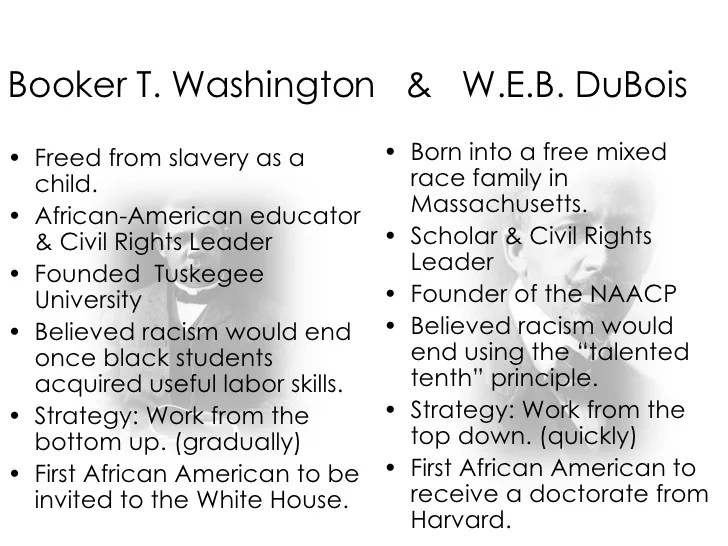Similarities between dubois and washington – The similarities between Du Bois and Washington, two prominent African American leaders of the late 19th and early 20th centuries, provide valuable insights into the complex history of race relations in the United States. Both men were influential figures in the fight for civil rights, and their ideas and activism continue to resonate today.
Du Bois and Washington shared a deep commitment to education as a means of empowering African Americans. They also recognized the importance of economic self-sufficiency and political activism in achieving racial equality. However, they differed in their approaches to these issues, with Du Bois advocating for a more confrontational approach and Washington favoring a more gradualist strategy.
Early Life and Education

Both W.E.B. Du Bois and Booker T. Washington were born into slavery during the Reconstruction Era. Du Bois was born in Great Barrington, Massachusetts, in 1868, to Alfred and Mary Silvina Du Bois. His father was a freed slave and his mother was a domestic servant.
Washington was born in Hale’s Ford, Virginia, in 1856, to Jane and Lewis Washington. His mother was a slave and his father was a white man who owned the plantation where Jane worked.
Du Bois and Washington both showed a thirst for knowledge from a young age. Du Bois attended Fisk University and Harvard University, where he earned a doctorate in history. Washington attended Hampton Institute and Tuskegee Institute, where he became the principal.
Racial Ideologies
Du Bois and Washington had different views on how to achieve racial equality. Du Bois believed that African Americans should focus on higher education and political activism to gain full citizenship rights. He was a founder of the National Association for the Advancement of Colored People (NAACP) in 1909.
Washington, on the other hand, believed that African Americans should focus on economic empowerment and vocational education. He argued that by becoming self-sufficient, African Americans would eventually gain respect and equality from white society. He founded Tuskegee Institute in 1881, which provided vocational training to African Americans.
Organizational Leadership
Du Bois and Washington were both charismatic leaders who founded and led influential organizations. Du Bois was a co-founder of the NAACP, which fought for civil rights through legal challenges and public campaigns. Washington founded Tuskegee Institute, which became a major center for vocational education and economic development for African Americans.
Du Bois and Washington had different leadership styles. Du Bois was a more intellectual and theoretical leader, while Washington was a more practical and pragmatic leader. Du Bois was often critical of Washington’s accommodationist approach, but Washington respected Du Bois’s intellect and commitment to the cause of racial equality.
Literary Contributions, Similarities between dubois and washington
Du Bois and Washington were both prolific writers who made significant contributions to American literature. Du Bois was a sociologist, historian, and essayist. His most famous work is The Souls of Black Folk(1903), which is a collection of essays on the history and culture of African Americans.
Washington was an educator, orator, and autobiographer. His most famous work is Up from Slavery(1901), which is an autobiography that tells the story of his rise from slavery to become the principal of Tuskegee Institute.
Influence on the Civil Rights Movement
Du Bois and Washington had a profound influence on the development of the Civil Rights Movement. Du Bois’s writings and activism helped to raise awareness of the plight of African Americans and to inspire a new generation of civil rights leaders.
Washington’s emphasis on economic empowerment and vocational education helped to create a strong economic base for the African American community, which was essential for the success of the Civil Rights Movement.
Legacy and Impact
Du Bois and Washington are two of the most important figures in American history. Their contributions to the fight for racial equality are immeasurable. Their writings and activism helped to shape the course of the Civil Rights Movement and to create a more just and equitable society for all Americans.
FAQ Section: Similarities Between Dubois And Washington
What were the main differences between Du Bois and Washington’s racial ideologies?
Du Bois believed that African Americans should confront racism head-on, while Washington advocated for a more gradualist approach that emphasized economic self-sufficiency.
How did Du Bois and Washington’s leadership styles differ?
Du Bois was a more charismatic and confrontational leader, while Washington was more pragmatic and focused on building institutions.
What was the impact of Du Bois and Washington’s activism on the Civil Rights Movement?
Du Bois and Washington’s ideas and activism helped to shape the strategies and goals of later civil rights leaders, such as Martin Luther King Jr.


